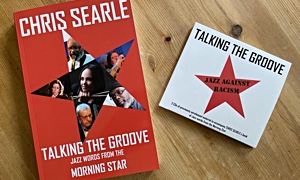Home » Jazz Articles » Book Review » Cafe Society: The wrong place for the Right people
Cafe Society: The wrong place for the Right people
 Cafe Society: The wrong place for the Right people
Cafe Society: The wrong place for the Right people Barney Josephson with Terry Trilling-Josephson
Hardback; 376 pages
ISBN: 978-0-252-03413-8
University of Illinois Press
2009
This wonderful, uplifting book tells the story of Barney Josephson and Cafe Society, the jazz cabaret Josephson set up in Greenwich Village, New York City in 1938. He ran the venture with great success—for several years, the original Downtown club was joined by an Uptown sibling—and not a little courage, until he was forced to close by the US government's infamous House Committee on Un-American Activities in 1949. The book is an absorbing read on several levels: as a jazz history, as a remembrance of New York's Left-leaning culturati of the 1930s through the 1950s, and as an example of how it is possible to run a profitable business with morality and principle even in a field otherwise dominated by chancers, gangsters and sleaze merchants. The book is an important addition to jazz literature and one so full of incident, charismatic personalities and good storytelling that the pages practically turn themselves.
Cafe Society: The wrong place for the Right people (the subtitle is the tag which Josephson used in press ads) is compiled from notes and tape recordings made by Josephson (1902-88). These have been carefully and lovingly put into book-form by his surviving wife, Terry Trilling-Josephson, a former professor of communications and performing arts at The City University, New York. To this narrative, Trilling-Josephson has added reminiscences from performers Josephson championed and nurtured, other friends and associates, writers Whitney Balliett and John S. Wilson, the producer and A&R man John Hammond, who in the early days of Cafe Society introduced many of its performers to Josephson, and patrons of Cafe Society. Dan Morgenstern wrote the foreword. The book has been put together with as much class as Barney Josephson brought to his life.
There are many evocative photographs, from Josephson's private collection, of the artists who appeared at the club. The cast list is epic, and includes musicians Billie Holiday (who caused the first Cafe Society sensation in 1939 with her twice-nightly performances of the anti-lynching lament "Strange Fruit"), Mary Lou Williams, Albert Ammons, James P. Johnson, Paul Robeson, Meade Lux Lewis, Lester Young, Count Basie, Lena Horne, Josh White, Sarah Vaughan, Sister Rosetta Tharpe, Teddy Wilson, Art Tatum, Django Reinhardt, Big Joe Turner, Alberta Hunter, Marian McPartland and Nellie Lutcher, and comedians Zero Mostel, Jimmy Savo, Imogen Coca and Jack Gilford.
To a man and a woman, the performers who worked with Josephson regarded him as a friend as much as an employer, a unique epitaph in the annals of nightclub management, and many credit him with either launching their careers or re-igniting them in later years. Josephson never took a cent of commission from the people he managed, regarded binding contracts as tantamount to the enslavement of an artist, paid his performers generously and, above all, championed African-American musicians, presenting them to mixed audiences at a time when other nightclubs, even in New York, were run on strictly segregationist lines. He had exquisite taste and a gift for theatre, and preferred engagements lasting several months to briefer runs, allowing an artist to grow into the room and develop as a performer. Josephon's artists loved him for all of this, for his humanity, and their testimonies make for moving, as well as historically illuminating reading.
There are numerous incidental delights along the way, among them Josephson's description of the pharmacopia of pills and white powders carried by Hollywood movie star Tallulah Bankhead (or rather, carried on Bankhead's behalf by her personal assistant) when she visited the club, and the extraordinary terms requested by singer and dancer Josephine Baker when Josephson offered her a season.
In 1935, Josephson's brother Leon, a lawyer, was arrested and imprisoned in Denmark, accused of being involved in a plot to assassinate Hitler. Barney, also of the liberal Left, and a prominent opponent of segregation, came to be regarded as suspect by association, and later, during the madness of the HUAC investigations, was effectively forced out of business. Artists were discouraged from appearing at Cafe Society and newspaper critics were ordered by their editors only to mention Josephson's club if they could find something bad to say about it. Patrons were fearful of being seen at Cafe Society in case they or their businesses were also blacklisted. In 1949, Josephson had to close. He returned to the jazz business in 1970, with another Greenwich Village spot, The Cookery, presenting many of the artists he first worked with at Cafe Society.
Barney Josephson's story is an inspiring one and deserves to be celebrated and remembered. Packed with insights and new facts and anecdotes, and assiduously researched, Cafe Society brings Josephson and his achievements vividly to life, doing its subject, and jazz in general, proud.
< Previous
Tony Grey: Stepping out of the Shadows
Next >
Eco, Arches & Eras
Comments
Tags
For the Love of Jazz
 All About Jazz has been a pillar of jazz since 1995, championing it as an art form and, more importantly, supporting the musicians who create it. Our enduring commitment has made "AAJ" one of the most culturally important websites of its kind, read by hundreds of thousands of fans, musicians and industry figures every month.
All About Jazz has been a pillar of jazz since 1995, championing it as an art form and, more importantly, supporting the musicians who create it. Our enduring commitment has made "AAJ" one of the most culturally important websites of its kind, read by hundreds of thousands of fans, musicians and industry figures every month.






















